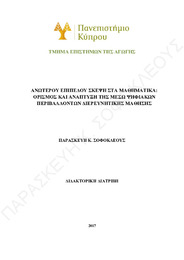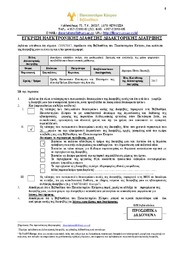| dc.contributor.advisor | Πίττα-Πανταζή, Δήμητρα | el |
| dc.contributor.author | Σοφοκλέους, Παρασκευή Κ. | el |
| dc.coverage.spatial | Κύπρος | el |
| dc.coverage.spatial | Cyprus | en |
| dc.creator | Σοφοκλέους, Παρασκευή Κ. | el |
| dc.date.accessioned | 2017-10-23T05:59:16Z | |
| dc.date.available | 2017-10-23T05:59:16Z | |
| dc.date.issued | 2017-05 | |
| dc.date.submitted | 2017-05-12 | |
| dc.identifier.uri | https://gnosis.library.ucy.ac.cy/handle/7/39707 | en |
| dc.description | Περιέχει βιβλιογραφικές παραπομπές. | el |
| dc.description | Αριθμός δεδηλωμένων πηγών στη βιβλιογραφία: 327 | el |
| dc.description | Διατριβή (Διδακτορική) -- Πανεπιστήμιο Κύπρου, Σχολή Κοινωνικών Επιστημών και Επιστημών Αγωγής, Τμήμα Επιστημών της Αγωγής, 2017. | el |
| dc.description | Η βιβλιοθήκη διαθέτει αντίτυπο της διατριβής σε έντυπη μορφή. | el |
| dc.description.abstract | Σκοπός της εργασίας ήταν η παρουσίαση ενός ολοκληρωμένου και κατάλληλου μοντέλου για τον ορισμό και τη μέτρηση της ανωτέρου επιπέδου σκέψης στα μαθηματικά και η εξέταση του πώς η χρήση νέων τεχνολογιών υποστηρίζει την ανάπτυξή της σε μαθητές Στ΄ δημοτικού.
Το δείγμα της έρευνας αποτέλεσαν 802 μαθητές Στ΄ δημοτικού. Οι μαθητές συμπλήρωσαν ένα δοκίμιο που αναπτύχθηκε στα πλαίσια της εργασίας αυτής και εξέτασε τις ικανότητες που περιγράφουν την ανωτέρου επιπέδου σκέψη στα μαθηματικά. Από αυτούς, οι 85 συμμετείχαν σε τρία διαφορετικά ψηφιακά περιβάλλοντα που είχαν σκοπό την ανάπτυξη της ανωτέρου επιπέδου σκέψης των μαθητών και συμπλήρωσαν το δοκίμιο που τους δόθηκε αρχικά και μετά τη συμμετοχή τους σε αυτά τα περιβάλλοντα. Τα περιβάλλοντα αυτά καθοδηγήθηκαν από τα χαρακτηριστικά της διερευνητικής μάθησης, βασίστηκαν στην αρχή της μάθησης με τεχνολογία και αξιοποίησαν προσεγγίσεις που βρέθηκαν αποτελεσματικές για την ανάπτυξη της ανωτέρου επιπέδου σκέψης στα μαθηματικά. Όμως, διέφεραν ως προς το βαθμό καθοδήγησης που έδιναν οι δραστηριότητες που περιλάμβαναν και ως προς την ακολουθία τους. Τα τρία ψηφιακά περιβάλλοντα διερευνητικής μάθησης ήταν: το ανοικτό (μόνο ανοικτά προβλήματα με ελάχιστη καθοδήγηση), το καθοδηγούμενο (καθοδηγούμενες δραστηριότητεςανοικτά προβλήματα) και το μικτό (ανοικτά προβλήματακαθοδηγούμενες δραστηριότητες ανοικτά προβλήματα).
Τα αποτελέσματα της εργασίας έδειξαν ότι:
(α) Η ανωτέρου επιπέδου σκέψη στα μαθηματικά είναι ένα πολυδιάστατο σύστημα που περιγράφεται από τέσσερις αλληλοσχετιζόμενες ικανότητες: τη βασική γνώση περιεχομένου, την κριτική σκέψη, τη δημιουργική σκέψη και τις σύνθετες διαδικασίες σκέψης στα μαθηματικά. Oι σύνθετες διαδικασίες σκέψης μπορούν να ερμηνευθούν άμεσα από την κριτική και τη δημιουργική σκέψη και έμμεσα από τη βασική γνώση. Ταυτόχρονα, η δημιουργική σκέψη μπορεί να ερμηνευθεί άμεσα από τη βασική γνώση και την κριτική σκέψη, ενώ η κριτική σκέψη μπορεί να ερμηνευθεί άμεσα από τη βασική γνώση.
(β) Οι μαθητές που συμμετείχαν και στα τρία ψηφιακά περιβάλλοντα διερευνητικής μάθησης, ενίσχυσαν την ανωτέρου επιπέδου σκέψη τους. Όμως, οι μαθητές που συμμετείχαν στο ανοικτό και στο καθοδηγούμενο περιβάλλον την ενίσχυσαν σε μεγαλύτερο βαθμό σε σχέση με αυτούς που συμμετείχαν στο μικτό.
(γ) Υπάρχουν τέσσερις ομάδες μαθητών διαφορετικών ικανοτήτων ως προς την ανωτέρου επιπέδου σκέψη στα μαθηματικά: η «Επιφανειακά Βασική» (μερική επιτυχία στη βασική γνώση), η «Εις βάθος Κριτική» (υψηλή επιτυχία σε βασική γνώση και κριτική σκέψη), η «Εις βάθος Δημιουργική» (υψηλή επιτυχία σε βασική γνώση και δημιουργική σκέψη) και η «Εις βάθος Κριτική και Δημιουργική» (υψηλή επιτυχία σε βασική γνώση, κριτική και δημιουργική σκέψη). Η «Επιφανειακά Βασική» ομάδα που συμμετείχε στο καθοδηγούμενο περιβάλλον ενίσχυσε σε μεγαλύτερο βαθμό την ανωτέρου επιπέδου σκέψη της σε σχέση με την αντίστοιχη ομάδα του μικτού. Η «Εις βάθος Κριτική» ομάδα που συμμετείχε στο ανοικτό περιβάλλον ενίσχυσε την ανωτέρου επιπέδου σκέψη της σε μεγαλύτερο βαθμό σε σχέση με την αντίστοιχη ομάδα του μικτού. Οι ομάδες «Εις βάθος Δημιουργική» και «Εις βάθος Κριτική και Δημιουργική» ενίσχυσαν την ανωτέρου επιπέδου σκέψη τους στο ίδιο βαθμό σε όποιο περιβάλλον και αν συμμετείχαν. Άρα, οι δυο πρώτες ομάδες μαθητών που είχαν αδυναμίες στην αποκλίνουσα σκέψη δεν επωφελήθηκαν από τη συμμετοχή τους στο μικτό περιβάλλον που συνδύαζε προσεγγίσεις ως προς τη δομή του. | el |
| dc.description.abstract | The purpose of this study was to present a comprehensive model of higher order thinking in mathematics and examine the ways to develop it through inquiry based teaching with the use of technology.
Eight hundred two 6th grade students participated in this study. All participants completed a test measuring higher order thinking in mathematics. In addition to this, eighty five students took part in three different intervention programs which aimed to develop students’ higher order thinking in mathematics with the use of technology. The students completed the test before and after their participation in the intervention programs. The intervention programs were guided by features of inquiry based learning and educational principles of learning with technology. They were also designed based on the results of previous research studies which showed a positive impact on students’ higher order thinking in mathematics. The three interventions differed in the extend of the pedagogical guidance that students received and the sequence of the presented tasks. The three in intervention programs were the following: the open intervention program (included only open ended tasks with minimal guidance), the guided intervention program (guides tasks open ended tasks) and the mixed intervention program (open ended tasks guided tasks open ended tasks).
The results of the study showed that:
(a) Higher order thinking in mathematics is a multidimensional system and can be described with four interrelated skills: basic knowledge, critical thinking, creative thinking and complex thinking processes in mathematics. Complex thinking processes can be explained directly by critical and creative thinking and indirectly by basic knowledge. Creative thinking can be explained directly by critical thinking and basic knowledge and critical thinking can be explained directly by basic knowledge.
(b) Students who participated in the three digital intervention programs enhanced their higher order thinking in mathematics. However, students who participated in the open and in the guided environment had better performance in higher order thinking, than students who participated in the mixed environment.
(c) Four different types of groups of students were identified based on their higher order thinking skills in mathematics. The “Superficial basic” group of students could successfully solve only some basic knowledge tasks. The “Deep critical” group could successfully solve almost all the basic knowledge and critical thinking tasks. The “Deep creative” group of students could successfully solve almost all the basic knowledge and creative thinking tasks, while the “Deep critical and creative” group could successfully solve almost all the basic knowledge, critical and creative thinking tasks. The “Superficial basic” group of students who participated in the guided environment had better performance in higher order thinking than the “Superficial basic” group who participated in the mixed intervention. The “Deep critical” group of students who participated in the open environment had better performance in higher order thinking than the “Deep critical” group who participated in the mixed intervention. The “Deep creative” and the “Deep critical and creative” group of students benefited in the same extend by their participation in the three different types of intervention programs. | en |
| dc.format.extent | xx, 321 σ. : πίν. ; 30 εκ. | el |
| dc.language.iso | gre | en |
| dc.publisher | Πανεπιστήμιο Κύπρου, Σχολή Κοινωνικών Επιστημών και Επιστημών Αγωγής / University of Cyprus, Faculty of Social Sciences and Education | |
| dc.rights | info:eu-repo/semantics/openAccess | en |
| dc.rights | Open Access | en |
| dc.subject.lcsh | Mathematics -- Study and teaching (Elementary) Case studies | en |
| dc.subject.lcsh | Mathematical ability -- Case studies | en |
| dc.subject.lcsh | Critical thinking -- Study and teaching (Elementary) -- Case studies -- Cyprus | en |
| dc.subject.lcsh | Inquiry-based learning | en |
| dc.subject.lcsh | Cognition in children | en |
| dc.subject.lcsh | Teaching -- Methodology -- Cyprus | en |
| dc.title | Ανώτερου επιπέδου σκέψη στα μαθηματικά : ορισμός και ανάπτυξη της μέσω ψηφιακών περιβαλλόντων διερευνητικής μάθησης | el |
| dc.title.alternative | Higher order thinking in mathematics: a proposed model and its development with technologically supported inquiry based teaching | en |
| dc.type | info:eu-repo/semantics/doctoralThesis | en |
| dc.contributor.committeemember | Xρίστου, Kωνσταντίνος | el |
| dc.contributor.committeemember | Γαγάτσης, Αθανάσιος | el |
| dc.contributor.committeemember | Ζαχαριάδης, Μάριος | el |
| dc.contributor.committeemember | Καλαβάσης, Φραγκίσκος | el |
| dc.contributor.committeemember | Christou, Constantinos | en |
| dc.contributor.committeemember | Gagatsis, Athanasios | en |
| dc.contributor.committeemember | Zachariades, Marios | en |
| dc.contributor.committeemember | Kalavassis, Fragkiskos | en |
| dc.contributor.department | Πανεπιστήμιο Κύπρου, Σχολή Κοινωνικών Επιστημών και Επιστημών Αγωγής, Τμήμα Επιστημών της Αγωγής | el |
| dc.contributor.department | University of Cyprus, Faculty of Social Sciences and Education, Department of Education | en |
| dc.subject.uncontrolledterm | ΑΝΩΤΕΡΟΥ ΕΠΙΠΕΔΟΥ ΣΚΕΨΗ ΣΤΑ ΜΑΘΗΜΑΤΙΚΑ | el |
| dc.subject.uncontrolledterm | ΒΑΣΙΚΗ ΓΝΩΣΗ ΠΕΡΙΕΧΟΜΕΝΟΥ ΣΤΑ ΜΑΘΗΜΑΤΙΚΑ | el |
| dc.subject.uncontrolledterm | ΚΡΙΤΙΚΗ ΣΚΕΨΗ ΣΤΑ ΜΑΘΗΜΑΤΙΚΑ | el |
| dc.subject.uncontrolledterm | ΔΗΜΙΟΥΡΓΙΚΗ ΣΚΕΨΗ ΣΤΑ ΜΑΘΗΜΑΤΙΚΑ | el |
| dc.subject.uncontrolledterm | ΣΥΝΘΕΤΕΣ ΔΙΑΔΙΚΑΣΙΕΣ ΣΚΕΨΗΣ ΣΤΑ ΜΑΘΗΜΑΤΙΚΑ | el |
| dc.subject.uncontrolledterm | ΔΙΕΡΕΥΝΗΤΙΚΗ ΜΑΘΗΣΗ | el |
| dc.subject.uncontrolledterm | ΤΕΧΝΟΛΟΓΙΑ | el |
| dc.subject.uncontrolledterm | HIGHER ORDER THINKING IN MATHEMATICS | en |
| dc.subject.uncontrolledterm | BASIC MATHEMATICAL KNOWLEDGE | en |
| dc.subject.uncontrolledterm | CRITICAL THINKING IN MATHEMATICS | en |
| dc.subject.uncontrolledterm | CREATIVE THINKING IN MATHEMATICS | en |
| dc.subject.uncontrolledterm | COMPLEX THINKING PROCESSES IN MATHEMATICS | en |
| dc.subject.uncontrolledterm | INQUIRY BASED LEARNING | en |
| dc.subject.uncontrolledterm | TECHNOLOGY | en |
| dc.identifier.lc | LB1590.5.S67 2017 | en |
| dc.author.faculty | Σχολή Κοινωνικών Επιστημών και Επιστημών Αγωγής / Faculty of Social Sciences and Education | |
| dc.author.department | Τμήμα Επιστημών της Αγωγής / Department of Education | |
| dc.type.uhtype | Doctoral Thesis | en |
| dc.rights.embargodate | 2020-05-12 | |
| dc.contributor.orcid | Πίττα-Πανταζή, Δήμητρα [0000-0002-9580-5674] | |


